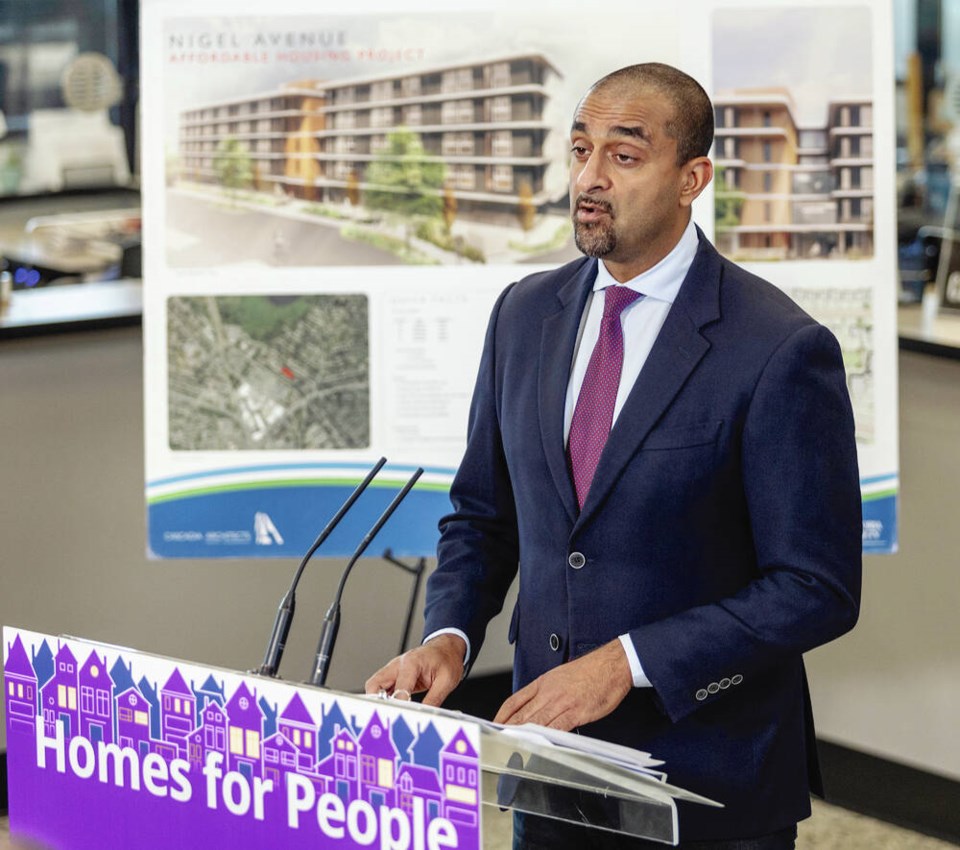Housing Minister Ravi Kahlon introduced changes to the Tenancy Act which, if passed, would restrict when landlords can evict a tenant for personal use of the suite and prevent landlords from hiking the rent when a couple has a baby or adds someone to the household who is under 19.
The proposed changes around adding minors to a rental unit is in response to some families who went public last year after their landlord told them their rent would increase by hundreds of dollars a month after the birth of a child because the baby is considered a new occupant. The changes will close that loophole, Kahlon said as he introduced the bill in the legislature Tuesday.
Currently, landlords are able to end a tenancy if they need the unit for themselves or for a family member. Under the proposed changes, the bill will ban personal use evictions in purpose-built rentals with five or more units. The tenancy act will also make clear that landlord cannot issue invalid eviction notices “intended to harass or bully tenants into moving out,” Kahlon said.
During a press conference in Victoria’s Fernwood neighbourhood, Premier David Eby said he knows there are problem tenants who don’t pay rent deliberately or damage the unit and on the flip side, there are cases where landlords unfairly raise the rent or illegally evict tenants.
“This bill attempts to close loopholes that both sides have used — to be flexible around addressing problem tenants and to be a firm around addressing problem landlords and illegal evictions,” he said.
Spencer Chandra Herbert, MLA for Vancouver-West End and the premier’s liaison for renters, said he’s seen cases in his riding where a multi-unit building is purchased by a family trust “and then each of the directors all of a sudden has a child that needs to move in instantly.”
“Sadly, in a number of cases, they didn’t fight it. They didn’t appeal it. They just accepted it,” Chandra Herbert said. “And there were no kids moving into that building. It was just a ruse to try and force good long-term tenants out to jack up the rents. People shouldn’t have to face that kind of eviction through fraudulent means.”
In cases of legal personal use evictions, the landlord or their family member must live in the unit for 12 months, up from six months. This it to prevent landlords from using this as a work-around to free up the unit for another tenant who would pay higher rent.
“While most landlords and tenants play by the rules, we know that too many people in B.C. are still facing unfair evictions under bad pretences,” Kahlon said.
Landlords will have to use a standardized form to issue a personal use eviction which Kahlon said will help the Residency Tenancy Branch — the government agency which resolves disputes between landlords and tenants — track such evictions and investigate potential bad faith evictions.
A University of B.C. study released last May found the vast majority of evictions in B.C. — 85 per cent — are deemed to be at “no fault” of the tenants. That rate is far greater than the national average of 65 per cent.
The report found that in B.C., compared with other provinces between 2016 and 2021, tenants were far more often asked to move for reasons such as landlords needing to use the property themselves, selling it, or demolishing or renovating it, the report says.
Kahlon promised landlords that improvements have been made to the Residential Tenancy Branch to reduce the backlog of dispute resolution cases so that “problematic tenants” can be removed more quickly and that landlords can recover money owed to them. There will also be more expedited hearings for emergency matters.
— With files from Dan Fumano and Lori Culbert
>>> To comment on this article, write a letter to the editor: [email protected]



